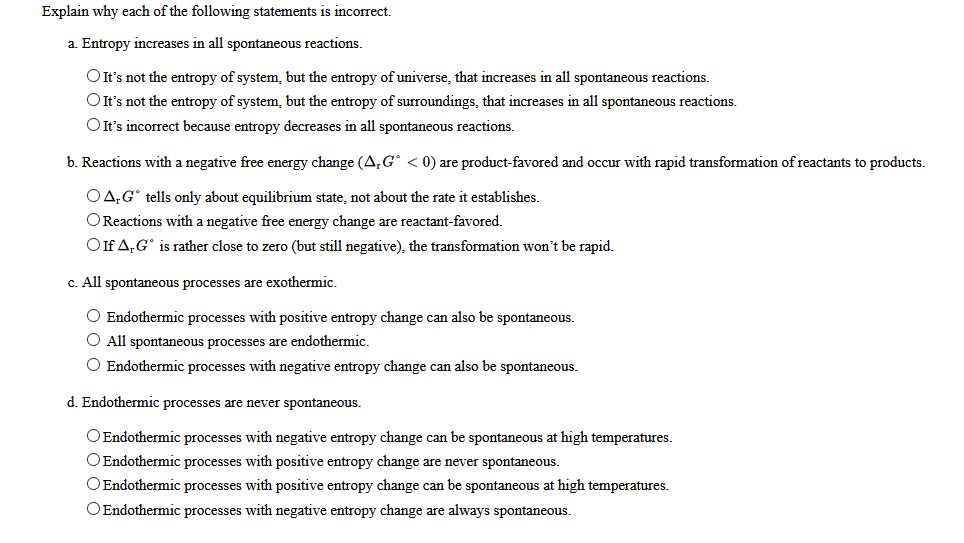Explain why each of the following statements is incorrect. a. Entropy increases in all spontaneous reactions. Ot's not the entropy of system, but the entropy of universe, that increases in all spontaneous reactions. Olt's not the entropy of system, but the entropy of surroundings, that increases in all spontaneous reactions. Ot's incorrect because entropy decreases in all spontaneous reactions. b. Reactions with a negative free energy change (A,G° < 0) are product-favored and occur with rapid transformation of reactants to products. O4,G° tells only about equilibrium state, not about the rate it establishes. OReactions with a negative free energy change are reactant-favored. OIf A;G° is rather close to zero (but still negative), the transformation won't be rapid. c. All spontaneous processes are exothermic. Endothermic processes with positive entropy change can also be spontaneous. All spontaneous processes are endothermic. O Endothermic processes with negative entropy change can also be spontaneous.
Explain why each of the following statements is incorrect. a. Entropy increases in all spontaneous reactions. Ot's not the entropy of system, but the entropy of universe, that increases in all spontaneous reactions. Olt's not the entropy of system, but the entropy of surroundings, that increases in all spontaneous reactions. Ot's incorrect because entropy decreases in all spontaneous reactions. b. Reactions with a negative free energy change (A,G° < 0) are product-favored and occur with rapid transformation of reactants to products. O4,G° tells only about equilibrium state, not about the rate it establishes. OReactions with a negative free energy change are reactant-favored. OIf A;G° is rather close to zero (but still negative), the transformation won't be rapid. c. All spontaneous processes are exothermic. Endothermic processes with positive entropy change can also be spontaneous. All spontaneous processes are endothermic. O Endothermic processes with negative entropy change can also be spontaneous.
Chemistry & Chemical Reactivity
9th Edition
ISBN:9781133949640
Author:John C. Kotz, Paul M. Treichel, John Townsend, David Treichel
Publisher:John C. Kotz, Paul M. Treichel, John Townsend, David Treichel
Chapter18: Principles Of Chemical Reactivity: Entropy And Free Energy
Section: Chapter Questions
Problem 68SCQ: Explain why each of the following statements is incorrect. (a) Entropy increases in all spontaneous...
Related questions
Question
100%

Transcribed Image Text:Explain why each of the following statements is incorrect.
a. Entropy increases in all spontaneous reactions.
OIt's not the entropy of system, but the entropy of universe, that increases in all spontaneous reactions.
OIt's not the entropy of system, but the entropy of surroundings, that increases in all spontaneous reactions.
OIt's incorrect because entropy decreases in all spontaneous reactions.
b. Reactions with a negative free energy change (A,G° < 0) are product-favored and occur with rapid transformation of reactants to products.
O4,G° tells only about equilibrium state, not about the rate it establishes.
OReactions with a negative free energy change are reactant-favored.
Oif A,G° is rather close to zero (but still negative), the transformation won't be rapid.
c. All spontaneous processes are exothermic.
O Endothermic processes with positive entropy change can also be spontaneous.
O All spontaneous processes are endothermic.
O Endothermic processes with negative entropy change can also be spontaneous.
d. Endothermic processes are never spontaneous.
OEndothermic processes with negative entropy change can be spontaneous at high temperatures.
OEndothermic processes with positive entropy change are never spontaneous.
OEndothermic processes with positive entropy change can be spontaneous at high temperatures.
OEndothermic processes with negative entropy change are always spontaneous.
Expert Solution
This question has been solved!
Explore an expertly crafted, step-by-step solution for a thorough understanding of key concepts.
Step by step
Solved in 2 steps

Knowledge Booster
Learn more about
Need a deep-dive on the concept behind this application? Look no further. Learn more about this topic, chemistry and related others by exploring similar questions and additional content below.Recommended textbooks for you

Chemistry & Chemical Reactivity
Chemistry
ISBN:
9781133949640
Author:
John C. Kotz, Paul M. Treichel, John Townsend, David Treichel
Publisher:
Cengage Learning

Chemistry & Chemical Reactivity
Chemistry
ISBN:
9781337399074
Author:
John C. Kotz, Paul M. Treichel, John Townsend, David Treichel
Publisher:
Cengage Learning


Chemistry & Chemical Reactivity
Chemistry
ISBN:
9781133949640
Author:
John C. Kotz, Paul M. Treichel, John Townsend, David Treichel
Publisher:
Cengage Learning

Chemistry & Chemical Reactivity
Chemistry
ISBN:
9781337399074
Author:
John C. Kotz, Paul M. Treichel, John Townsend, David Treichel
Publisher:
Cengage Learning


Chemistry: An Atoms First Approach
Chemistry
ISBN:
9781305079243
Author:
Steven S. Zumdahl, Susan A. Zumdahl
Publisher:
Cengage Learning

Chemistry
Chemistry
ISBN:
9781305957404
Author:
Steven S. Zumdahl, Susan A. Zumdahl, Donald J. DeCoste
Publisher:
Cengage Learning

Chemistry for Engineering Students
Chemistry
ISBN:
9781337398909
Author:
Lawrence S. Brown, Tom Holme
Publisher:
Cengage Learning